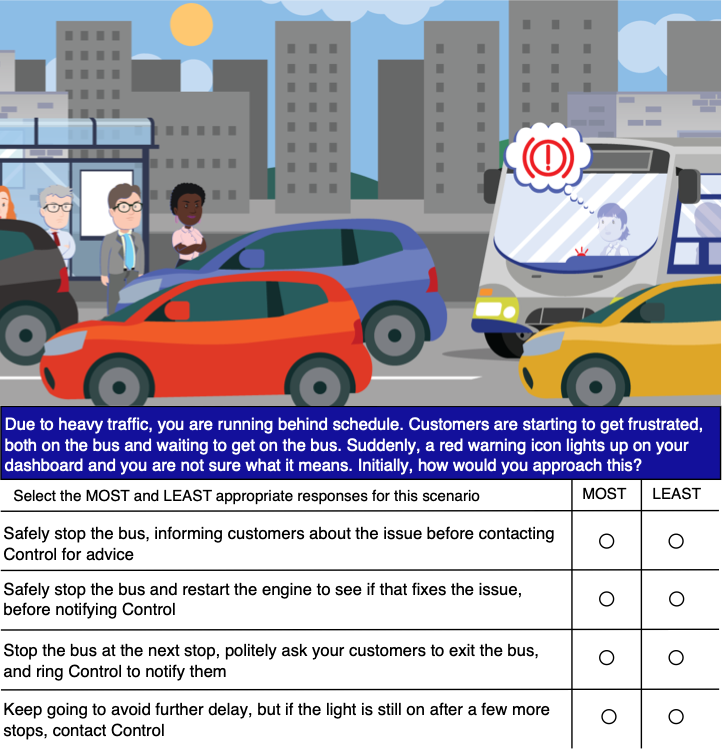Bus Driver SJT
Call or email to discuss our tests or to book a demonstration of our platform +44 (0)7872 019525 or support@viewpoint-psychology.com
What do Situational Judgement Tests assess?
A Situational Judgement Test or SJT is a type of psychometric test that presents candidates with real-life work situations and then asks them to decide on the best response to that situation. The Bus Driver SJT is a situational judgement test that is specifically geared towards someone applying to become a Bus Driver.
Typical roles that would use our Bus Driver SJT are:
1. Bus Drivers
2. Trainee Bus Drivers
Free Tests!
Take a free test. On completion you will be able to download a detailed report based on your results. We will not ask you for any personal information to be able to view your report.
Take a free Critical Reasoning Test
Overview of the Bus Driver SJT
Our Bus Driver SJT presents candidates with 12 distinct situations that many bus drivers might find familiar across a variety of organisations. For each situation, 4 possible responses are given, each presenting a feasible response someone in a role may take. Candidates are asked to review these responses and select 1 response they consider to be ‘ most appropriate’ and another they think would be the ‘least appropriate’. As with all our SJTs, the Bus SJT is untimed but typically takes up to 10 minutes to complete.
Our SJT measures 3 competencies / behaviours:
1. Customer Service: Providing excellent customer service
2. Performing effectively: Acting reliably & responsibly in the management of tasks, duties, interactions and own health
3. Performing safely: Always being alert to safety and security risks, and adhering to safety instructions and procedures
Example Bus Driver SJT question

How to do well in your Bus Driver SJT
To do well in a Bus Driver SJT, it is good to implement the following tips;
1. Prioritise Passenger Safety and Comfort: For bus drivers, the safety and comfort of passengers is paramount. In SJT scenarios, choose responses that showcase your commitment to driving safely, adhering to traffic regulations, and ensuring a smooth and comfortable journey for passengers. Highlight your ability to maintain calm and control in various driving conditions.
2. Demonstrate Excellent Customer Service Skills: Good customer service is essential in a bus driver's role. Opt for SJT responses that reflect your skill in dealing with passengers courteously, providing clear information about routes and stops, and handling queries or complaints with empathy and professionalism.
3. Show Reliability and Time Management: Reliability and strict adherence to timetables are crucial for bus drivers. In the SJT, select responses that demonstrate your punctuality, consistency in maintaining schedules, and efficient time management. Emphasise your dedication to ensuring that bus services run smoothly and on time for the benefit of passengers.
